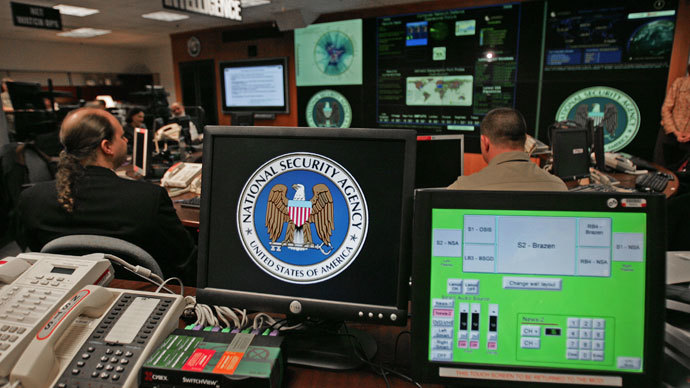NSA has ability to read 75% of all US internet traffic - report

Newly unveiled National Security Agency programs detail how the US government has the ability to monitor approximately 75 percent of American internet traffic, and further discloses how telecommunications companies are compelled to provide such data.
The programs - known as Blarney, Fairview, Oakstar, Lithium, and Stormbrew - are able to monitor the writing of emails, not just a message’s metadata, according to The Wall Street Journal. The programs also affect digital phone calls placed inside the US.
Among other capabilities, the systems can “reach roughly 75 percent of all US internet traffic, including a wide array of communications by foreigners and Americans.”
The NSA commands internet service providers (ISPs) to send “various stream internet traffic it believes most likely to contain foreign intelligence,” then copies that data and searches through it.
NSA officials have claimed in recent weeks that the intelligence
agency “touches” a mere 1.6 percent of internet traffic, although
TechCrunch speculated that rhetoric refers to information that
has been sent to the NSA and “culled to their liking.”
Perhaps the most disturbing news is that the NSA worked in
conjunction with the FBI to monitor all email and text messages
for the six month period surrounding the 2002 Olympic Games in
Salt Lake City, Utah.
One NSA official, who wished to remain anonymous, told The Wall
Street Journal that the NSA is “not wallowing willy-nilly”
through Americans’ communications. “We want high-grade
ore.”
The WSJ report is based on interviews with current and former
government officials familiar with the NSA’s tactics. They claim
the filtering was designed to identify communications that either
begin or end outside the US, although the “broad reach makes
it more likely that purely domestic communications will be
incidentally intercepted and collected,” not foreign ones.
NSA spokeswoman Vanee Vines said that oversight is in place in
the event that domestic communication is inadvertently recorded,
including “minimization procedures that are approved by the US
attorney general and designed to protect the privacy of United
States persons.”
While lawmakers have asserted that NSA surveillance is necessary
to protect national security, Blarney is known to have been in
use since before the September 11, 2001 terrorist attacks. The
program was operating near important fiber-optic landing points,
including one in San Francisco, California and another in New
Jersey, with the intention of intercepting foreign communications
entering and exiting the US.
Such laws are permitted under Section 702 of the Foreign Intelligence Surveillance Act (FISA), which was expanded in 2008. Section 702 grants the NSA and the FBI the ability to monitor people who are “reasonably believed” to be located outside the US. Before FISA was expanded, it allowed the government to track targets if there was “probable cause” that they were an “agent of a foreign power.”
The PRISM surveillance program is also permitted under Section 702. One of the first Edward Snowden leaks to be published, an internal NSA document described PRISM’s method of collecting stored internet communications as “the number one source of raw intelligence used for NSA analytic reports.”
Multiple telecommunications companies have denied that PRISM requests administered by the government require bulk data turnovers - an indication that they are more precise than the internet filtration systems under Barney and other newly disclosed programs.














